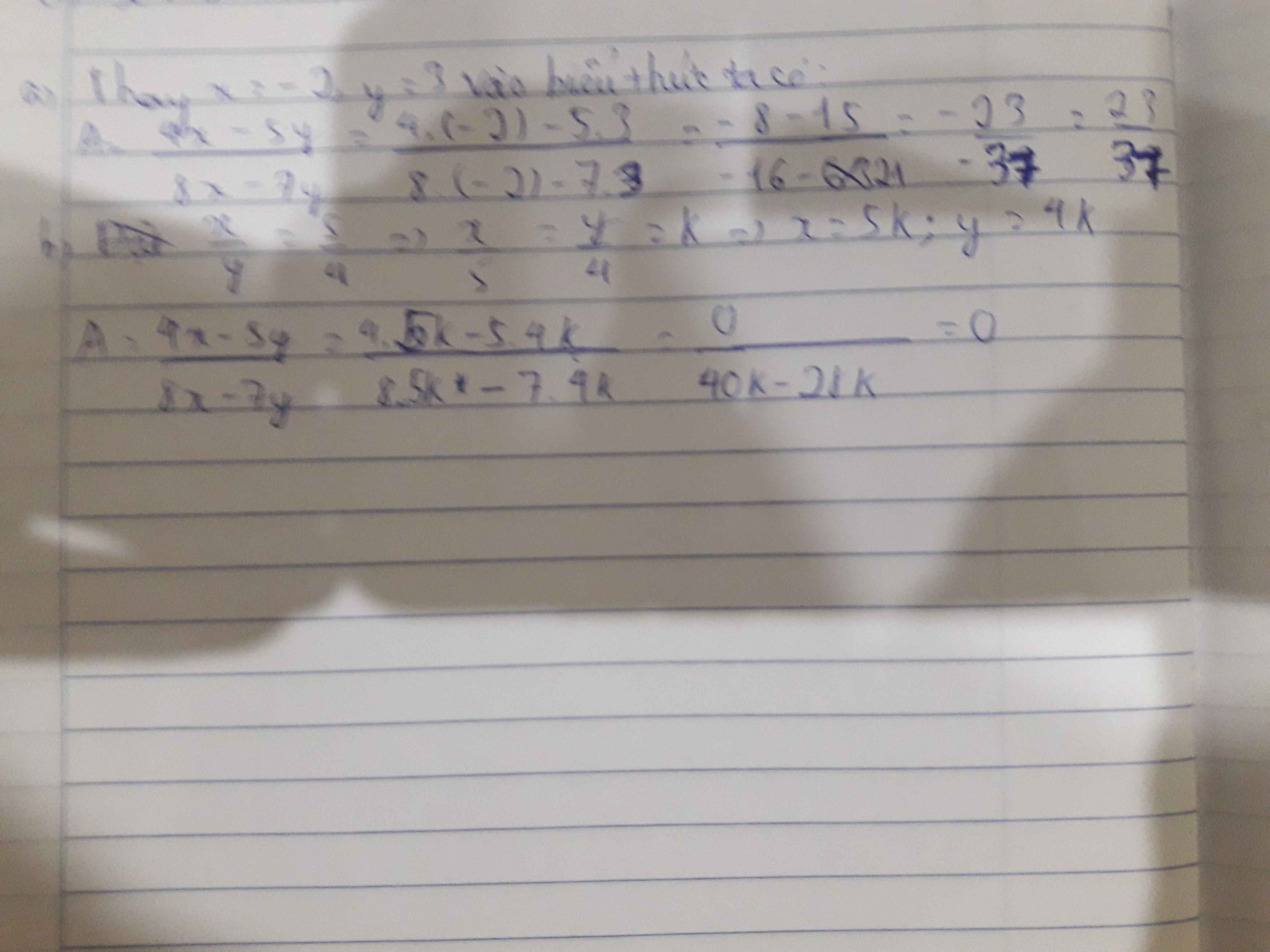Cho biểu thức: f(x)=x2-4x=3
a,Tính giá trị của biểu thức f(x) tại x=0; x=1; x=3
b,Giá trị x nào là nghiệm của đa thức f(x)? Vì sao?
Hãy nhập câu hỏi của bạn vào đây, nếu là tài khoản VIP, bạn sẽ được ưu tiên trả lời.

a, ĐKXĐ: x≠±3
A=\(\left(\dfrac{3-x}{x+3}.\dfrac{x^2+6x+9}{x^2-9}+\dfrac{x}{x+3}\right):\dfrac{3x^2}{x+3}\)
A=\(\left(\dfrac{3-x}{x+3}.\dfrac{\left(x+3\right)^2}{\left(x+3\right)\left(x-3\right)}+\dfrac{x}{x+3}\right):\dfrac{3x^2}{x+3}\)
A=\(\left(\dfrac{3-x}{x-3}+\dfrac{x}{x+3}\right):\dfrac{3x^2}{x+3}\)
A=\(\left(\dfrac{9-x^2}{x^2-9}+\dfrac{x^2-3x}{x^2-9}\right):\dfrac{3x^2}{x+3}\)
A=\(\left(\dfrac{-3}{x+3}\right):\dfrac{3x^2}{x+3}\)
A=\(\dfrac{-1}{x^2}\)
b, Thay x=\(-\dfrac{1}{2}\) (TMĐKXĐ) vào A ta có:
\(\dfrac{-1}{\left(-\dfrac{1}{2}\right)^2}\)=-4
c, A<0 ⇔ \(\dfrac{-1}{x^2}< 0\) ⇔ x2>0 (Đúng với mọi x)
Vậy để A<0 thì x đúng với mọi giá trị (trừ ±3)

a, ĐKXĐ: x≠±2
A=\(\left(\dfrac{x}{x^2-4}+\dfrac{2}{2-x}+\dfrac{1}{x+2}\right)\left(x-2+\dfrac{10-x^2}{x+2}\right)\)
A=\(\left(\dfrac{x}{x^2-4}-\dfrac{2x+4}{x^2-4}+\dfrac{x-2}{x^2-4}\right)\left(\dfrac{x^2+2x}{x+2}-\dfrac{2x+4}{x+2}+\dfrac{10-x^2}{x+2}\right)\)
A=\(\left(\dfrac{-6}{x^2-4}\right)\left(\dfrac{6}{x+2}\right)\)
A=\(\dfrac{-36}{\left(x-2\right)\left(x+2\right)^2}\)
b, |x|=\(\dfrac{1}{2}\)
TH1z: x≥0 ⇔ x=\(\dfrac{1}{2}\) (TMĐKXĐ)
TH2: x<0 ⇔ x=\(\dfrac{-1}{2}\) (TMĐXĐ)
Thay \(\dfrac{1}{2}\), \(\dfrac{-1}{2}\) vào A ta có:
\(\dfrac{-36}{\left(\dfrac{1}{2}-2\right)\left(\dfrac{1}{2}+2\right)^2}\)=\(\dfrac{96}{25}\)
\(\dfrac{-36}{\left(\dfrac{-1}{2}-2\right)\left(\dfrac{-1}{2}+2\right)^2}\)=\(\dfrac{32}{5}\)
c, A<0 ⇔ \(\dfrac{-36}{\left(x-2\right)\left(x+2\right)^2}\) ⇔ (x-2)(x+2)2 < 0
⇔ {x-2>0 ⇔ {x>2
[ [
{x+2<0 {x<2
⇔ {x-2<0 ⇔ {x<2
[ [
{x+2>0 {x>2
⇔ x<2
Vậy x<2 (trừ -2)

a, Thay x = -2 ; y = 3 ta được
\(A=\dfrac{4\left(-2\right)-5.3}{8\left(-2\right)-7.3}=\dfrac{-8-15}{-16-21}=\dfrac{23}{37}\)
b, Ta có \(\dfrac{x}{y}=\dfrac{5}{4}\Rightarrow\dfrac{x}{5}=\dfrac{y}{4}=k\Rightarrow x=5k;y=4k\)
Thay vào ta được \(A=\dfrac{4.5k-5.4k}{8.5k-7.4k}=\dfrac{0}{40k-28k}=0\)

Lời giải:
a.
\(A=\left[\frac{(2+x)^2}{(2-x)(2+x)}+\frac{4x^2}{(2-x)(2+x)}-\frac{(2-x)^2}{(2-x)(2+x)}\right]:\frac{x(x-3)}{x^2(2-x)}\)
\(=\frac{(2+x)^2+4x^2-(2-x)^2}{(2-x)(2+x)}.\frac{x^2(2-x)}{x(x-3)}=\frac{4x(x+2)}{(2-x)(2+x)}.\frac{x^2(2-x)}{x(x-3)}=\frac{4x^2}{x-3}\)
b.
Khi $x=12$ thì $A=\frac{4.12^2}{12-3}=64$
c.
$A=1\Leftrightarrow \frac{4x^2}{x-3}=1$
$\Leftrightarrow 4x^2=x-3$
$\Leftrightarrow 4x^2-x+3=0$
$\Leftrightarrow (2x-\frac{1}{4})^2=-\frac{47}{16}< 0$ (vô lý)
Vậy không tồn tại $x$
d. Để $A$ nguyên thì $\frac{4x^2}{x-3}$ nguyên
$\Leftrightarrow 4x^2\vdots x-3$
$\Leftrightarrow 4(x^2-9)+36\vdots x-3$
$\Leftrightarrow 36\vdots x-3$
$\Leftrightarrow x-3\in\left\{\pm 1;\pm 2;\pm 3;\pm 4;\pm 9; \pm 12; \pm 36\right\}$
Đến đây bạn có thể tự tìm $x$ được rồi, chú ý ĐKXĐ để loại ra những giá trị không thỏa mãn.
e.
$A>4\Leftrightarrow \frac{4x^2}{x-3}>4$
$\Leftrightarrow \frac{x^2}{x-3}>1$
$\Leftrightarrow \frac{x^2-x+3}{x-3}>0$
$\Leftrightarrow x-3>0$ (do $x^2-x+3>0$ với mọi $x$ thuộc ĐKXĐ)
$\Leftrightarrow x>3$. Kết hợp với đkxđ suy ra $x>3$

a: \(A=\left(x+1\right)\left(x-2\right)-x\left(2x-3\right)+2x^2+4\)
\(=x^2-x-2-2x^2+3x+2x^2+4\)
\(=x^2+2x+2\)
\(a,A=x^2-x-2-2x^2+3x+4+2x^2=x^2+2x+2\\ c,A=\left(x^2+2x+1\right)+1=\left(x+1\right)^2+1\ge1>0\)

Đề sai rồi bạn
Sửa đề: f(x) = x² - 4x + 3
a) f(0) = 0 - 4.0 + 3 = 3
f(1) = 1 - 4.1 + 3 = 0
f(3) = 9 - 4.3 + 3 = 0
b) x = 1 và x = 3 là nghiệm của đa thức f(x) vì f(1) = 0 và f(3) = 0